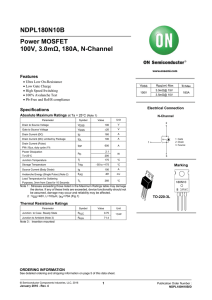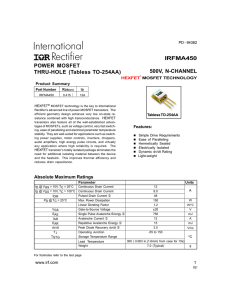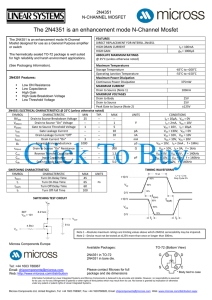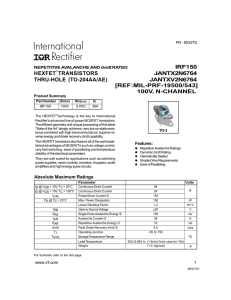POWER MOSFET SURFACE MOUNT(SMD-1) 60V, N
advertisement
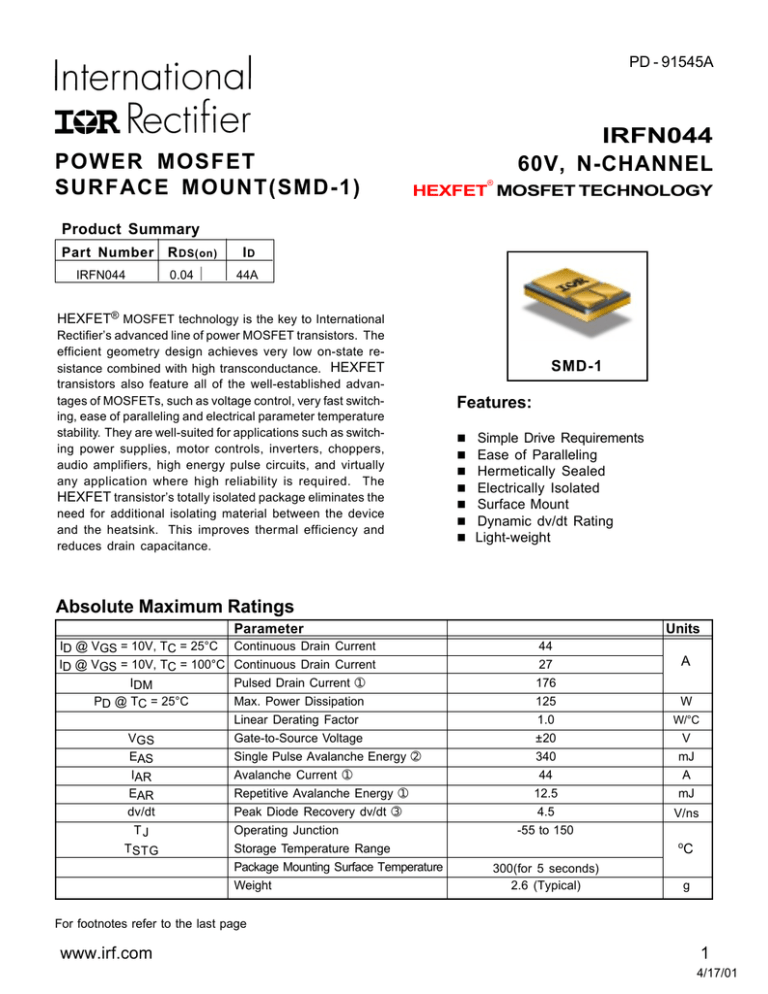
PD - 91545A POWER MOSFET SURFACE MOUNT(SMD-1) IRFN044 60V, N-CHANNEL ® HEXFET MOSFET TECHNOLOGY Product Summary Part Number IRFN044 R DS(on) 0.04 Ω ID 44A HEXFET® MOSFET technology is the key to International Rectifier’s advanced line of power MOSFET transistors. The efficient geometry design achieves very low on-state resistance combined with high transconductance. HEXFET transistors also feature all of the well-established advantages of MOSFETs, such as voltage control, very fast switching, ease of paralleling and electrical parameter temperature stability. They are well-suited for applications such as switching power supplies, motor controls, inverters, choppers, audio amplifiers, high energy pulse circuits, and virtually any application where high reliability is required. The HEXFET transistor’s totally isolated package eliminates the need for additional isolating material between the device and the heatsink. This improves thermal efficiency and reduces drain capacitance. SMD-1 Features: n n n n n n n Simple Drive Requirements Ease of Paralleling Hermetically Sealed Electrically Isolated Surface Mount Dynamic dv/dt Rating Light-weight Absolute Maximum Ratings Parameter ID @ VGS = 10V, TC = 25°C ID @ VGS = 10V, TC = 100°C IDM PD @ TC = 25°C VGS EAS IAR EAR dv/dt TJ T STG Continuous Drain Current Continuous Drain Current Pulsed Drain Current ➀ Max. Power Dissipation Linear Derating Factor Gate-to-Source Voltage Single Pulse Avalanche Energy ➁ Avalanche Current ➀ Repetitive Avalanche Energy ➀ Peak Diode Recovery dv/dt ➂ Operating Junction Storage Temperature Range Package Mounting Surface Temperature Weight Units 44 27 176 125 1.0 ±20 340 44 12.5 4.5 -55 to 150 A W W/°C V mJ A mJ V/ns o 300(for 5 seconds) 2.6 (Typical) C g For footnotes refer to the last page www.irf.com 1 4/17/01 IRFN044 Electrical Characteristics @ Tj = 25°C (Unless Otherwise Specified) Min Typ Max Units Test Conditions 60 — — V VGS = 0V, ID = 1.0mA — 0.68 — V/°C Reference to 25°C, ID = 1.0mA — — 0.040 Ω 2.0 17 — — — — — — 4.0 — 25 250 V S( ) IGSS IGSS Qg Q gs Q gd td(on) tr td(off) tf LS + LD Gate-to-Source Leakage Forward Gate-to-Source Leakage Reverse Total Gate Charge Gate-to-Source Charge Gate-to-Drain (‘Miller’) Charge Turn-On Delay Time Rise Time Turn-Off Delay Time Fall Time Total Inductance — — — — — — — — — — — — — — — — — — — 4.1 100 -100 88 15 52 23 130 81 79 — Ciss C oss C rss Input Capacitance Output Capacitance Reverse Transfer Capacitance — — — 2400 1100 230 — — — VGS = 10V, ID = 27A ➃ VDS = VGS, ID = 250µA VDS > 15V, IDS = 27A ➃ VDS= 48V ,VGS=0V VDS = 48V, VGS = 0V, TJ = 125°C VGS = 20V VGS = -20V VGS =10V, ID = 44A VDS = 30V Ω Parameter BVDSS Drain-to-Source Breakdown Voltage ∆BV DSS/∆T J Temperature Coefficient of Breakdown Voltage RDS(on) Static Drain-to-Source On-State Resistance VGS(th) Gate Threshold Voltage gfs Forward Transconductance IDSS Zero Gate Voltage Drain Current µA nA nC VDD = 30V, ID = 44A, RG = 9.1Ω ns nH Measured from the center of drain pad to center of source pad. VGS = 0V, VDS = 25V f = 1.0MHz pF Source-Drain Diode Ratings and Characteristics Parameter Min Typ Max Units IS ISM VSD t rr Q RR Continuous Source Current (Body Diode) Pulse Source Current (Body Diode) ➀ Diode Forward Voltage Reverse Recovery Time Reverse Recovery Charge ton Forward Turn-On Time — — — — — — — — — — 44 176 2.5 220 1.6 Test Conditions A V nS µC Tj = 25°C, IS = 44A, VGS = 0V ➃ Tj = 25°C, IF = 44A, di/dt ≤ 100A/µs VDD ≤ 50V ➃ Intrinsic turn-on time is negligible. Turn-on speed is substantially controlled by LS + LD. Thermal Resistance Parameter RthJC Junction-to-Case Min Typ Max Units — — 1.0 Test Conditions °C/W Note: Corresponding Spice and Saber models are available on the G&S Website. For footnotes refer to the last page 2 www.irf.com IRFN044 Fig 1. Typical Output Characteristics Fig 3. Typical Transfer Characteristics www.irf.com Fig 2. Typical Output Characteristics Fig 4. Normalized On-Resistance Vs. Temperature 3 IRFN044 3 4 Fig 5. Typical Capacitance Vs. Drain-to-Source Voltage Fig 6. Typical Gate Charge Vs. Gate-to-Source Voltage Fig 7. Typical Source-Drain Diode Forward Voltage Fig 8. Maximum Safe Operating Area www.irf.com IRFN044 V DS VGS RD D.U.T. RG + -V DD 10V Pulse Width ≤ 1 µs Duty Factor ≤ 0.1 % Fig 10a. Switching Time Test Circuit VDS 90% 10% VGS Fig 9. Maximum Drain Current Vs. Case Temperature td(on) tr t d(off) tf Fig 10b. Switching Time Waveforms Fig 11. Maximum Effective Transient Thermal Impedance, Junction-to-Case www.irf.com 5 IRFN044 15V L VDS D .U .T . RG IA S 20V 1 D R IV E R + - VD D A 0 .01 Ω tp Fig 12a. Unclamped Inductive Test Circuit V (B R )D S S tp Fig 12c. Maximum Avalanche Energy Vs. Drain Current IAS Current Regulator Same Type as D.U.T. Fig 12b. Unclamped Inductive Waveforms 50KΩ QG 12V 0 .2µF .3µF 10 V QGS QGD + V - DS VGS VG 3mA Charge Fig 13a. Basic Gate Charge Waveform 6 D.U.T. IG ID Current Sampling Resistors Fig 13b. Gate Charge Test Circuit www.irf.com IRFN044 Footnotes: ➀ Repetitive Rating; Pulse width limited by ➂ ISD ≤ 44A, di/dt ≤ 25A/µs, maximum junction temperature. ➁ VDD = 25V, starting TJ = 25°C, L= 0.35mH Peak IL = 44A, VGS = 10V ➃ Pulse width ≤ 300 µs; Duty Cycle ≤ 2% VDD ≤ 60V, TJ ≤ 150°C Case Outline and Dimensions — SMD-1 PAD ASSIGNMENTS 1- DRAIN 2- GATE 3- SOURCE IR WORLD HEADQUARTERS: 233 Kansas St., El Segundo, California 90245, USA Tel: (310) 252-7105 TAC Fax: (310) 252-7903 Visit us at www.irf.com for sales contact information. Data and specifications subject to change without notice. 04/01 www.irf.com 7

